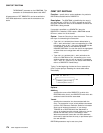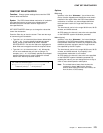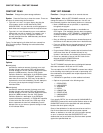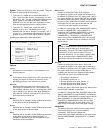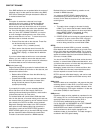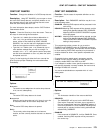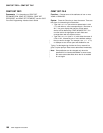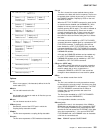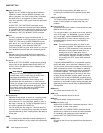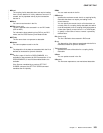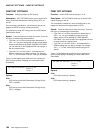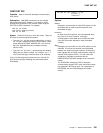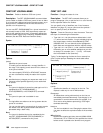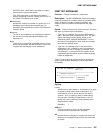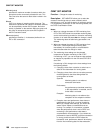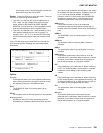
CEMT SET FILE
EMptyreq (
vsam only
)
Applies only to a VSAM file that has been defined to
VSAM as a cluster with the REUSE parameter, and
which is opened in non-RLS access mode. It indicates
that when a file is next opened, its data is erased.
If the file is opened in RLS access mode this parameter
has no effect.
A CEMT SET FILE EMPTYREC command can be
applied only to files that are closed and either disabled
or unenabled, and has no effect on the data until the file
is opened. A SET FILE EMPTYREQ command can be
canceled by a SET FILE NOEMPTYREQ command.
ENabled
The file is available for use by transactions and, if
closed, it is opened on the first request. If the command
CEMT SET FILE(
value
) CLOSED ENABLED is given
while the file is in use, the status of the file becomes
‘closed-unenabled’. If the command CEMT SET
FILE(
value
) CLOSED is given while the file is in use, the
file is disabled to prevent new users accessing the file.
EXclusive
Records on the file are protected from simultaneous
update by being placed under exclusive control when a
read for update is issued.
Forceclose
Similar to SET FILE CLOSED, except that any existing
users of the file are abended (abend code ‘AKC3’ or
‘ATCH’). As for CLOSED, the close is effected by the
last of these users.
Data integrity
Closing a file using the FORCECLOSE option
causes tasks of any current users of the file to be
terminated immediately by the CICS task
FORCEPURGE mechanism. Data integrity is not
guaranteed with this mechanism. In some extreme
cases (for example, if an error occurs during backout
processing) CICS might terminate abnormally. For
this reason, closing files using the FORCECLOSE
option should be restricted to exceptional
circumstances.
| Keylength(
value
)
| Specifies the key length of records in a coupling facility
| data table that does not require pre-loading from a
| source data set. To set a keylength, specify a value in
| the range 1 through 16. To clear a keylength (set it to
| null values), specify KEYLENGTH(0).
| You can specify the key length for a file that does not
| currently refer to a coupling facility data table, but which
| could be switched to use a coupling facility data table at
| a later date.
| LOAd
| The coupling facility data table requires loading from a
| source data set before it is fully usable; the transactions
| that use this coupling facility data table rely on it
| containing the records from the specified source data
| set.
| LOCking (CFDT only)
| The coupling facility data table is to use the locking
| model, in which records are locked when they are
| updated.
Maxnumrecs(
value
)
specifies the maximum number of records that the data
table for this file can hold.
| For any type of table, if you want to set a limit, specify a
| value in the range 1 to 99999 999. If you do not want
| any limit to apply, specify MAXNUMRECS(0), which
| CICS interprets as no limit, and sets internally to the
| maximum positive fullword value (+2147483647 or
|X'7FFFFFFF').
| Note: The new value takes effect only when a new
| data table is created. This happens on each file
| open for a CICS-maintained or user-maintained
| data table, but only when the table does not
| already exist for a CF data table. Once a
| coupling facility data table has been created, you
| can change the maximum number of records
| only through the CFDT server MVS command
| interface.
| To specify MAXNUMRECS for a recoverable coupling
| facility data table, use a value that is between 5 and
| 10% more than the maximum number of records that the
| table is expected to contain. This allows for additional
| records that might be created internally for processing
| recoverable requests. The margin to be left for this
| internal processing depends on the level of use of the
| coupling facility data table, and the nature of that use.
| An effect of this is that the NOSPACE condition (with a
| RESP2 of 102) can be raised on a WRITE or REWRITE
| request to a recoverable coupling facility data table that
| apparently has fewer records than the MAXNUMRECS
| limit specifies.
NOAddable
You cannot add records to the file.
NOBrowse
You cannot browse records in the file.
NODelete
You cannot delete records from the file.
NOEMptyreq (
vsam only
)
Applies only to VSAM files. It indicates that when a file is
next opened, its data is not erased.
A CEMT SET FILE NOEMPTYREC command can be
applied only to files that are closed and either disabled
or unenabled, and cancels the implicit request in a
previous SET FILE EMPTYREQ command.
NOEXclusive
Records on the file are not protected from simultaneous
update.
182 CICS Supplied Transactions



